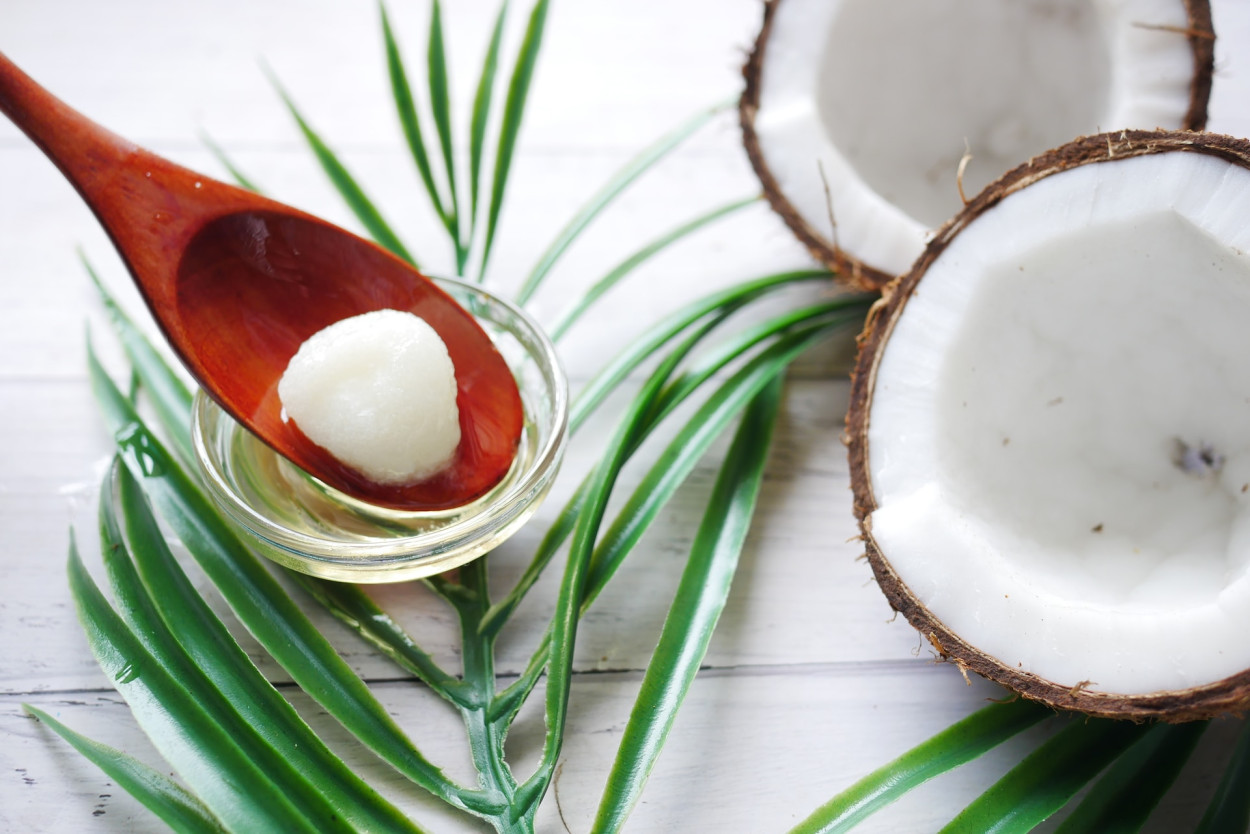Research on coconut oil for dogs suggests potential benefits and also proves advantageous for dogs when included in their diet or applied topically. Coconut oil can be safely added to a dog's food, used as a supplement, or applied to the skin in small amounts.

Coconut oil is believed to enhance a dog's immune system, contribute to weight loss, possess anti-inflammatory and anti-fungal properties, and potentially improve cognitive function.
However, more comprehensive research is needed, and individual responses can vary. Consulting with a veterinarian before using coconut oil for dogs is recommended.
Scientific Aspects of Coconut Oil for Dogs
The foundation of coconut oil's scientific benefits rests in its distinct composition, featuring high levels of medium-chain fatty acids (MCFAs) such as lauric acid. These MCFAs contribute antimicrobial and antioxidant properties, potentially addressing infections and inflammation.
The quick metabolic breakdown of MCFAs offers speedy energy and may play a role in managing weight. Coconut oil's versatility extends to skincare, acting as a natural moisturizer with antimicrobial benefits for both skin and hair.
While promising, ongoing research highlights potential individual variations, underscoring the need to seek personalized advice from healthcare professionals.
Understanding Canine Skin & Health
Understanding canine skin and health is vital for proper pet care. A dog's skin reflects their overall well-being, serving as an indicator of internal health.
Regular checks for abnormalities and a balanced diet contribute to a dog's skin and overall health. Consulting with a veterinarian is essential for addressing specific needs and ensuring the well-being of our canine companions.
Benefits of Coconut Oil
Nutritional Advantages for Skin
Coconut oil isn't just a topical solution; it offers nutritional benefits from the inside out. Rich in essential fatty acids, it promotes a shiny coat and healthy skin.
Antimicrobial Properties
Discover how coconut oil's natural antimicrobial properties can combat common skin issues, from fungal infections to bacterial problems.
Moisturizing Effects
Dry, flaky skin is uncomfortable for dogs. Learn how coconut oil serves as an excellent moisturizer, preventing and alleviating dryness.
Anti-inflammatory Action
Inflammation is a common culprit in many skin conditions. Explore how coconut oil's anti-inflammatory properties can soothe your dog's skin.
Improves Dog Odor
Due to its antimicrobial and antifungal properties, applying coconut oil to your dog's fur and skin can effectively alleviate lingering odors. Furthermore, unrefined virgin coconut oil imparts a pleasant, fresh, nutty, and coconut aroma, thereby enhancing the overall fragrance of your dog's coat.
Selecting the Best Coconut Oil for Dogs
Not all coconut oils are created equal. Learn about the different types available and how to choose the best one for your furry friend. Choose unrefined, virgin, organic coconut oil for dogs, ensuring it's 100% pure without additives.
Opt for a transparent appearance and consult your vet before introducing it into your dog's diet. Start with small amounts and monitor their response.
How to Use Coconut Oil for Dogs
Using coconut oil for dogs can be beneficial, and here are various ways to incorporate it into their routine:
Dietary Supplement:
- Add a small amount (e.g., 1/4 teaspoon to 1 teaspoon, depending on the dog's size) to their regular food.
- Start with a conservative amount and observe how your dog reacts before gradually increasing.
Topical Application:
- Take a small amount of coconut oil and massage it into your dog's skin to reap the moisturizing benefits.
- Apply coconut oil to dry or cracked paw pads, nose, or areas with skin issues.
- Can be used as a natural, chemical-free paw balm.
Coat Conditioning:
- Rub a small amount into your dog's coat to promote shine and reduce odors.
- It can help detangle fur and make grooming easier.
Oral Health:
Coconut oil can be used as a natural toothpaste by applying a small amount to your dog's teeth and gums. It can help freshen your breath and support oral health.
Joint Health:
Mix coconut oil into your dog's food to potentially assist with joint health. Some believe it may have anti-inflammatory effects.
Pill Coating:
Use coconut oil to coat pills, making it easier for your dog to swallow medication. This can be especially helpful for dogs who are reluctant to take pills.
Ear Cleaner:
Coconut oil serves as a natural and efficient solution for various ear-related problems for dogs. Mix coconut oil with a few drops of lavender oil and use it as an ear cleaner, applying a small amount to a cotton ball.
Introduce Gradually:
If your dog is new to coconut oil, introduce it gradually to avoid digestive upset.
Realizing the Risks
While coconut oil for dogs has become popular, there are doubts and warnings from vets. Some worry about the high-fat content, which could lead to issues like obesity. It's crucial to be careful about how much you give to your dog and to consider their individual needs.
Vets often recommend moderation and caution against using coconut oil as a substitute for balanced dog food. Before adding it to your dog's diet, it's best to check with your vet, especially considering factors like your dog's age, weight, and overall health.
Balancing Act: Benefits vs. Risks
Using coconut oil for dogs is a balancing act between potential benefits and risks. While some believe it can improve a dog's skin, coat, and digestion, there are concerns about its high-fat content leading to obesity and pancreatitis.
It's important to strike a balance, use it in moderation, and consult with a vet to ensure it aligns with your dog's specific needs and health conditions.

Alternatives to Coconut Oil for Dogs
There are several alternatives to coconut oil for dogs, each with its own set of benefits. Some alternatives include:
Fish Oil
Rich in omega-3 fatty acids, fish oil supports coat health, joint function, and overall well-being.
Olive Oil
Contains healthy fats and antioxidants, promoting skin health and adding shine to the coat.
Flaxseed Oil
Another source of omega-3 fatty acids, is beneficial for skin and coat health.
Sunflower Oil
Contains vitamin E, which supports skin health.
Salmon Oil
Packed with omega-3 fatty acids, it can improve skin and coat condition.
Pumpkin Seed Oil
Rich in antioxidants and omega-3 fatty acids, promoting skin health.
Chia Seeds
A source of omega-3 fatty acids, fiber, and protein that can be added to their food.
Coconut Water
A hydrating alternative that provides electrolytes and is low in fat.
Always introduce new supplements or oils gradually, observing how your dog responds. Consult with your veterinarian to determine the most suitable option based on your dog's specific needs, health conditions, and dietary requirements.
Veterinary consultation
Veterinary consultation provides tailored advice based on factors such as your dog's breed, age, and specific health conditions.
Vets can recommend the appropriate dosage to prevent over-supplementation, identify potential interactions with medications, and monitor your dog's overall health through regular check-ups.
This professional guidance is crucial for ensuring that the introduction of coconut oil aligns with your dog's unique health needs, contributing positively to their overall well-being.
Success Stories and Testimonials
Read real-life experiences from dog owners who have witnessed positive outcomes with coconut oil. These anecdotes offer valuable insights into the potential benefits for your furry companion.
Conclusion
In the journey of caring for your dog's skin, coconut oil stands out as a versatile and natural solution. Understanding its benefits and risks empowers you to make informed decisions for your furry friend.
Remember, moderation is key, and consulting your veterinarian ensures tailored care for your dog's unique needs. Embrace the goodness of coconut oil, keeping your dog's skin healthy, shiny, and free from common issues.
FAQs
Is coconut oil safe for all dogs?
In general, coconut oil is safe for dogs, but individual reactions may vary. Always start with a small amount and monitor for any adverse effects.
What are the signs of sensitivity or allergies to coconut oil?
Look out for symptoms such as itching, redness, swelling, or gastrointestinal issues. If these signs appear, discontinue use and consult a veterinarian.
How often should I apply coconut oil to my dog's skin?
The frequency of application depends on your dog's needs. For general maintenance, a couple of times a week may suffice, while specific skin issues may require more frequent application.
Can coconut oil be used for preventive care even if my dog doesn't have skin issues?
Absolutely! Coconut oil's properties make it suitable for preventive care, promoting overall skin health and preventing potential issues.
Are there any alternatives to coconut oil for dog skin care?
While coconut oil is a popular choice, other alternatives include olive oil, jojoba oil, and shea butter. Consult with your vet to determine the best option for your dog.
Feel free to reach out if you have any more questions or need further guidance on your pet care journey!









